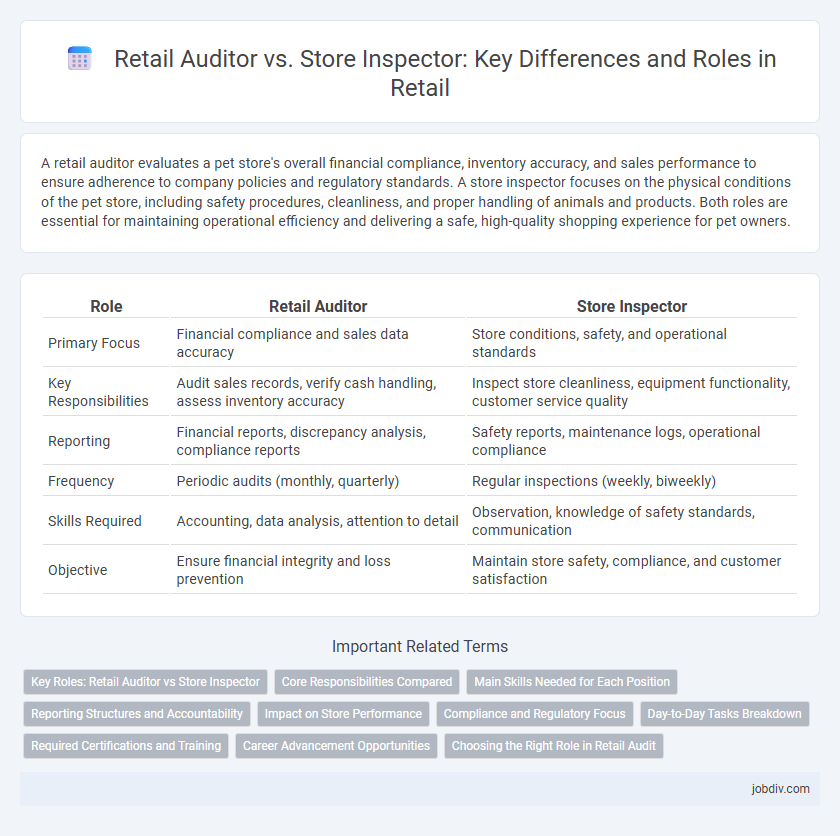A retail auditor evaluates a pet store's overall financial compliance, inventory accuracy, and sales performance to ensure adherence to company policies and regulatory standards. A store inspector focuses on the physical conditions of the pet store, including safety procedures, cleanliness, and proper handling of animals and products. Both roles are essential for maintaining operational efficiency and delivering a safe, high-quality shopping experience for pet owners.
Table of Comparison
| Role | Retail Auditor | Store Inspector |
|---|---|---|
| Primary Focus | Financial compliance and sales data accuracy | Store conditions, safety, and operational standards |
| Key Responsibilities | Audit sales records, verify cash handling, assess inventory accuracy | Inspect store cleanliness, equipment functionality, customer service quality |
| Reporting | Financial reports, discrepancy analysis, compliance reports | Safety reports, maintenance logs, operational compliance |
| Frequency | Periodic audits (monthly, quarterly) | Regular inspections (weekly, biweekly) |
| Skills Required | Accounting, data analysis, attention to detail | Observation, knowledge of safety standards, communication |
| Objective | Ensure financial integrity and loss prevention | Maintain store safety, compliance, and customer satisfaction |
Key Roles: Retail Auditor vs Store Inspector
Retail auditors specialize in examining financial records, compliance with company policies, and accuracy of inventory data to ensure profitability and reduce losses. Store inspectors focus on assessing store conditions, including cleanliness, safety standards, visual merchandising, and adherence to operational procedures to enhance customer experience. Both roles collaborate to maintain retail integrity, but auditors emphasize financial accuracy while inspectors prioritize store environment and regulatory compliance.
Core Responsibilities Compared
Retail auditors focus on financial accuracy, compliance with company policies, and inventory verification through detailed transaction analysis and audit reporting. Store inspectors prioritize operational standards, store cleanliness, visual merchandising, and adherence to safety and regulatory requirements during physical store evaluations. Both roles ensure retail performance but differ in scope, with auditors targeting financial integrity and inspectors emphasizing store presentation and compliance.
Main Skills Needed for Each Position
Retail auditors require strong analytical skills to assess financial records, compliance, and operational efficiency, alongside proficiency in data analysis software and attention to detail. Store inspectors need keen observational abilities to evaluate store conditions, customer service, and adherence to brand standards, complemented by excellent communication skills for reporting and coordinating with store management. Both roles demand a deep understanding of retail operations, but auditors emphasize financial accuracy while inspectors focus on visual merchandising and operational compliance.
Reporting Structures and Accountability
Retail auditors typically report to regional or corporate compliance managers, ensuring standardized financial and operational audits across multiple store locations. Store inspectors often report directly to store managers or district supervisors, focusing on adherence to local store policies and daily operational standards. Accountability for retail auditors centers on audit accuracy and regulatory compliance, while store inspectors are primarily accountable for maintaining store presentation and safety protocols.
Impact on Store Performance
Retail auditors systematically evaluate compliance and operational efficiency, providing actionable insights that directly enhance store performance through improved inventory accuracy and financial controls. Store inspectors focus on physical store conditions and adherence to safety and merchandising standards, ensuring a consistent shopping environment that supports customer satisfaction and sales growth. Together, these roles create a comprehensive oversight framework, driving operational excellence and elevating overall retail store performance.
Compliance and Regulatory Focus
Retail auditors emphasize compliance by systematically evaluating financial records and operational processes to ensure adherence to internal policies and external regulations. Store inspectors focus on regulatory compliance through on-site assessments, verifying health, safety, and merchandising standards are met according to industry codes. Both roles are essential in maintaining retail accountability, with auditors targeting procedural accuracy and inspectors concentrating on physical store compliance.
Day-to-Day Tasks Breakdown
Retail auditors conduct detailed financial and compliance reviews of store operations, focusing on inventory accuracy, sales transactions, and adherence to corporate policies. Store inspectors perform routine evaluations of store cleanliness, safety standards, visual merchandising, and customer service quality to ensure brand consistency. Both roles collaborate to optimize store performance but differ in targeting financial integrity versus operational standards.
Required Certifications and Training
Retail auditors typically require certifications such as Certified Internal Auditor (CIA) or Certified Retail Auditor (CRA) to validate expertise in financial analysis and compliance auditing, alongside training in risk management and accounting principles. Store inspectors often need certifications like OSHA safety training and food safety manager certification, with hands-on training in store operations, health regulations, and safety protocols. Both roles emphasize continuous professional development but differ significantly in their certification focus: auditors lean towards financial and regulatory standards, while inspectors prioritize operational safety and regulatory compliance.
Career Advancement Opportunities
Retail auditors often have greater career advancement opportunities due to their involvement in financial analysis, compliance assessments, and strategic reporting that align with corporate leadership roles. Store inspectors typically progress within operational management, focusing on store maintenance, safety, and merchandising standards, which can lead to store manager or district supervisor positions. Both roles offer distinct pathways; retail auditors may transition into finance or corporate governance careers, while store inspectors build expertise in retail operations and team leadership.
Choosing the Right Role in Retail Audit
Retail auditors specialize in evaluating financial records, inventory accuracy, and compliance with company policies, ensuring the integrity of retail operations. Store inspectors focus on the physical condition of the store, including safety protocols, visual merchandising, and adherence to operational standards. Choosing between these roles depends on whether one prefers data-driven financial analysis or hands-on operational inspections in retail audit.
Retail Auditor vs Store Inspector Infographic

 jobdiv.com
jobdiv.com